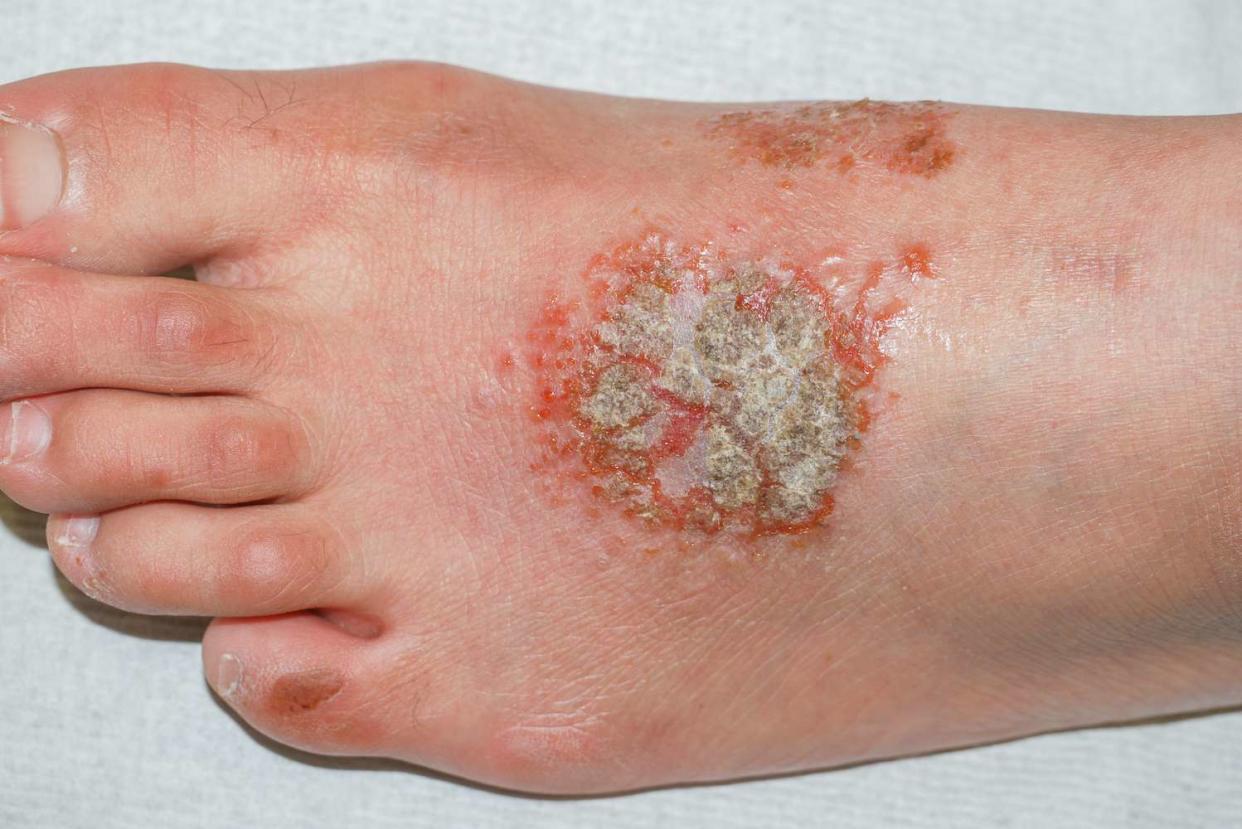What Are Eczema Blisters?

Reproduced with permission from ©DermNet New Zealand www.dermnetnz.org 2023.
Medically reviewed by William Truswell, MD
Eczema blisters differ from regular blisters in that regular blisters, caused by friction, are usually only slightly uncomfortable and irritating. Eczema blisters, on the other hand, are intensely itchy and can be quite painful.
Eczema, also known as atopic dermatitis, is an inflammatory skin condition marked by a scaly, inflamed rash. Around 10% of people in the United States have eczema.
It is important to note that eczema is not a singular skin condition but rather a group of skin conditions. Some forms of eczema are associated with the formation of eczema blisters. These types of eczema are known as weeping eczema.

Reproduced with permission from ©DermNet New Zealand www.dermnetnz.org 2023.
This article will explain everything there is to know about eczema blisters, including what eczema blisters look like, where eczema blisters appear, what causes eczema blisters, treatment options, prevention, and more.
What Do Eczema Blisters Look Like?
The way eczema blisters look will depend on the type of eczema. Dyshidrotic eczema causes blisters that appear as small fluid-filled bubbles on the skin, usually on the hands or feet.
Nummular eczema can cause small blisters that crust over and join together in a coin-shaped sore. The color of the blisters will vary depending on skin tone; those with darker skin may see brown pigmentation, while those with lighter skin may see red or pink spots.
Eczema on Dark Skin
Eczema is often misdiagnosed in those with darker skin tones because eczema appears differently on different skin tones. For those with darker skin, eczema can be dark brown, purple, or ashen gray in color.
Where They Occur on the Body
The type of eczema involved will dictate where the blisters show up. For example, dyshidrotic eczema can cause blisters only on the palms of your hands, the soles of your feet, and on the edges of your fingers and toes.
Nummular eczema causes blisters, but these eczema blisters appear on the hands or limbs.
Eczema Blisters vs. Pimples
Eczema blisters differ from acne in that these are entirely different skin conditions. Acne produces pus-filled bumps. Eczema blisters may have clear fluid or pus and are accompanied by an itchy rash.
What Causes Eczema Blisters?
Eczema has a variety of triggers, which can vary for each person according to the type of eczema they have.
For dyshidrotic eczema, common triggers include:
Metals (particularly nickel)
Sweaty palms
Laundry detergent
Seasonal allergies
Hot, humid weather
For nummular eczema, common triggers include:
Intense stress
Dry air
Heat and humidity
Skin injuries (i.e., bug bite or scrape)
Skin infections
Heavy alcohol consumption
Medications that cause extremely dry skin
Dehydrated skin
How to Find Relief
Eczema blisters can be painful, itchy, and highly uncomfortable, which is why finding relief is imperative. In order to treat the eczema blisters, the eczema itself must be addressed. While there is no cure for eczema, there are treatment options available. Eczema treatment will depend on the severity of the condition and the age of the person affected.
Possible treatment options for eczema include:
Topical steroids: Topical steroids can help reduce itchiness as well as inflammation.
Topical calcineurin inhibitors: These medications inhibit the function of the enzyme that activates a type of white blood cell known as T cells in the immune system, which, in turn, can help control inflammation.
Oral antihistamines: Antihistamines are a class of medications primarily used to treat allergies. If the cause of your eczema is an allergy, antihistamines can be helpful.
Antibiotics, antifungals, antivirals: These medications are helpful when the breaks in the skin due to eczema sores or scratching the itchy rash result in secondary infections.
Systemic medications: Systemic medications (those that work throughout the body) are usually only needed in severe cases. Corticosteroids taken for a short time are often used in severe adult cases, but are not recommended for children.
Biologics: These medications are typically used in cases of moderate to severe eczema.
Do your best to avoid scratching your blisters because this can increase your risk of infection. Signs of infection include:
Redness
Pustules (pus-filled bumps)
Cold sores (oral herpes)
For nummular eczema, signs of infection include yellow or golden crust on the nummular eczema spots.
Preventing Eczema Blisters
Ideally, you will want to eczema blisters from occurring in the first place. Prevention strategies for eczema blisters include:
Avoiding triggers
Keeping skin moisturized
Managing stress
Using phototherapy (light therapy)
Getting mental health support
Again, it is very important to avoid scratching the blisters as much as possible in order to avoid infection.
Summary
Eczema (atopic dermatitis) is a group of skin conditions that cause a scaly, inflamed rash. Some types of eczema, such as dyshidrotic or nummular eczema, are associated with the formation of eczema blisters.
The type of eczema will impact the appearance and location of the blisters and what triggers a flare. While there is no cure for eczema, it is still a manageable skin condition. Knowing your triggers is imperative for effectively managing eczema. Keeping your skin moisturized in the event of a flare-up and taking necessary steps as advised by a healthcare provider can help calm the flares and help you be more comfortable.
Frequently Asked Questions
Does eczema normally blister?
Eczema can cause blisters but not always. There are several types of eczema. Two types of eczema associated with blisters are nummular eczema and dyshidrotic eczema.
What gets rid of eczema blisters quickly?
While there is no quick fix for eczema blisters, taking proper care of the blisters and avoiding infection can help prevent them from getting worse. Avoid scratching the blisters as much as possible, keep the area moisturized, and follow your healthcare provider's instructions for treatment closely.
Should you pop eczema blisters?
No, you should not pop eczema blisters. You should also avoid touching and itching the blisters as much as possible. This will help you avoid developing an infection.

